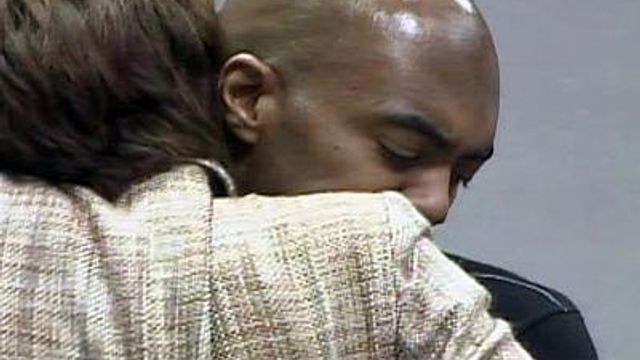Samuel Cooper gets life for shooting deaths
A Wake County jury deliberated for 15 hours over three days before recommending that Samuel James Cooper be sentenced to life in prison for killing five men in 2006 and 2007.
Posted — UpdatedJurors deliberated for 15 hours over three days before reaching their decision Tuesday.
Samuel James Cooper, 33, was convicted April 6 of five counts of first-degree murder in the deaths of Ossama Haj-Hussein, 43, on May 12, 2006; LeRoy Jernigan, 41, on June 3, 2006; Timothy Barnwell, 34, on April 27, 2007; Ricky High, 48, on Oct. 12, 2007; and Tariq Hussain, 52, on Oct. 14, 2007.
Cooper sat with his head down and showed little emotion as Superior Court Judge Henry Hight read the jurors' recommendation and sentenced him to life imprisonment.
Cooper had nothing to say. His victims' families, however, did.
"He took a wonderful man from us. He ripped our hearts out, and nobody will ever be able to understand that," Jernigan's mother, Lorraine Jernigan, said in court. "I hope he has to see every one of his victims' faces every day for the rest of his life."
LeRoy Jernigan, a husband and father of two, was working as a cleaning contractor at the Circus Restaurant on Wake Forest Road in Raleigh when Cooper shot him once in the early-morning hours and fled the scene in his truck.
"I wish Mr. Cooper would just rot in hell," Lorraine Jernigan said outside court later Tuesday. "He killed my son, and as far as I'm concerned, right now, they (the jury) just killed him all over again."
Cooper's trial trial lasted more than a month and consisted of 52 state witnesses and 11 defense witnesses during 16 days of testimony. It was the first in recent history in which a defendant was tried for five homicides at the same time.
That was a factor in the jury reaching its decision, juror William Evaul said.
"People were not happy about the choice we had to make," he said. "I think if the cases had been separated, you might have been able to get a death penalty on one or two or three of them, but connecting all five, and then saying, 'If I give death for one, it's like giving death for all five.' That was the hard part."
Timothy Barnwell's mother thanked law enforcement authorities, the court and the jury for removing "a greedy, dangerous person from the streets of our country."
"Someday, he is going to face the ultimate judge, the God Almighty," Phyllis Barnwell said, "and it will be eternal damnation."
Her only son, a Porsche enthusiast and Star Wars memorabilia collector, was at home in his second-floor North Raleigh apartment when Cooper handcuffed, hogtied and duct-taped him and then ransacked his apartment. Timothy Barnwell managed to jump over the balcony before Cooper shot him five times.
"He should have a long and tedious life and remember all of those that he killed so brutally, especially my baby," Phyllis Barnwell said.
None of Cooper's family members were present for his sentencing
At issue in the month-long trial was not whether Cooper committed the crimes, but whether he acted with premeditation and deliberation at the times of the shootings.
Defense attorneys argued that Cooper suffered from post-traumatic stress disorder and dissociative disorder as a result of years of "sadistic and ritualized" abuse by his father, and at the time the shootings, he was absent of any emotions and in a delusional state.
The state argued that Cooper is a cold-blooded serial killer who was deliberate in the crimes, knew that they were wrong and went to great lengths to hide evidence that could link him to them. He might have some mental issues, prosecutors said, but none of them affected his ability to form a specific intent to kill.
Garner police arrested Cooper in November 2007 following a robbery at a local Bank of America. Ballistics experts linked evidence from the homicides to a 9 mm handgun Cooper dropped while fleeing police following that bank robbery.
Cooper later confessed to the killings in a series of interviews with police.
Wake County Assistant District Attorney Jeff Cruden commended the defense after the jury's recommendation and apologized to the victims' families.
"I want to apologize for my failures to the victims' families," he said. "I just want to tell them I'm sorry."
Cruden prosecuted Cooper previously when he escaped from prison in 1999, and he was one of several court personnel who helped detain Cooper after he assaulted a court deputy and tried to take her gun during that trial.
"I saw what this defendant was capable of doing," Cruden said of that day. "I (also) prosecuted him in this case for the five murders that he committed. I hope and pray I hope I don't prosecute him for No. 6."
• Credits
Copyright 2024 by Capitol Broadcasting Company. All rights reserved. This material may not be published, broadcast, rewritten or redistributed.






